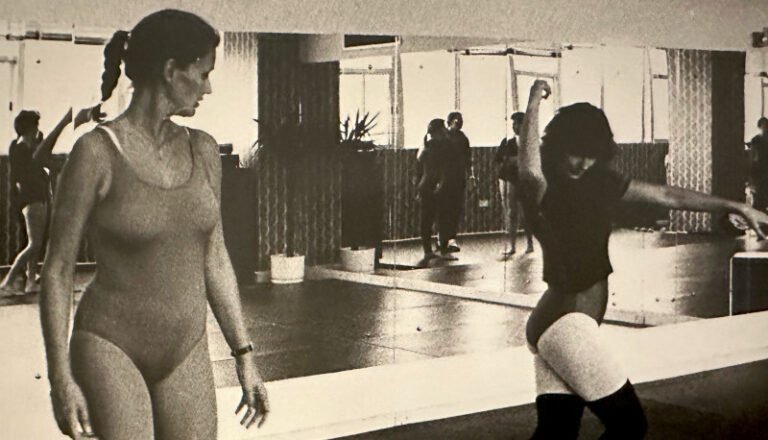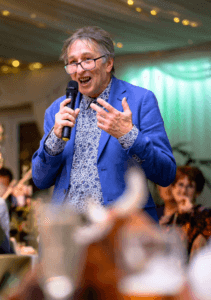Lena teaching dance-moves in her Abu Dhabi gym – 1981
Autumn 2014
Official letters — from our bank, from the Council, from the utility companies, from the NHS — always came addressed to Lena. Although everything we owned or paid for was in our joint names, Lena was the one who dealt with all our domestic affairs. But nowadays, it was always me who opened the letters. Lena didn’t organise us any more. In fact she didn’t read. Or write.
I’d started noticing it a couple of years ago. She liked to read before sleep, and sometimes, when it was an English book, she’d ask me what a word meant.
— What’s a ’tan door’?
— Come on, Lena. You know ‘tan’. Like suntan. Golden brown. So some sort of brown door, I guess. A bit weird though — it’s the first time I’ve heard someone describing a door as ’tan’.
— No, I don’t think it means that. It says ‘He added a tan door outside for making bread.’ You don’t make bread with a door.
— Let me see. Ah. It’s not a tan door. It’s a tandoor. Like Indian tandoori food. It must be an oven.
The next night she asked again.
— What’s a ‘tan door’?
And the same question the third night. Quite literally, like a broken record. Remember in the old days, how records (kids, we’re talking vinyls) would get stuck and repeat the same section over and over when the stylus met a scratch or a bit of muck in the groove? Well, that’s how Lena’s question sounded. And in a way, it helped me to understand amyloid plaques, a term I’d often come across when reading up about Alzheimer’s. According to the experts, amyloid plaques are one of the characteristics of the disease, little clumps of protein that bunch together and disrupt cell function. Yes, just like muck on a record. That repeated question was Alzheimer’s announcing itself.
A few months before, Lena had enjoyed reading Khaled Hosseini’s book, ‘The Kite Runner’. This was his follow-up, ‘A Thousand Splendid Suns’, and she’d reached page 10 — that was the place she’d left the postcard she was using for a bookmark. A week later the postcard was still in the same place, and so was the book, on the bedside table. A month later, with the book now clearly abandoned, I discreetly put it back in the bookcase. I never saw Lena reading again.
It was around the same time she stopped using her laptop. She’d always been a prolific letter-writer, and when she discovered Facebook she’d loved keeping in touch with all her friends online. But not any more.
Get the inside story
So when Lena’s letter came inviting her to sign up for DAPA — the acronym for Warwick University’s Dementia and Physical Activity research programme — it was me who opened it. To be honest, I’d almost forgotten Dr Hunter’s mention of this study on that awful diagnosis day nine months before. But now I remembered. I remembered thinking at the time … a research programme? Maybe there was hope for Lena yet. Maybe physical activity could turn Alzheimer’s around — or at least slow it down. It was just a little chink of light on a very dark day.
Back then enrolment on the program seemed a great idea, perfect for Lena. She’d always loved the gym. In fact, when I first met Lena in Abu Dhabi she was the gym instructor at a popular beauty salon in the city, putting her years of training as a professional dancer to good use.
But now, as I read the DAPA invitation letter, I was having second thoughts. Not because there was anything particularly onerous about the programme:
- Two one-hour sessions of moderate exercise each week for four months.
- Exercises tailored to suit each of the six participants in each group, using an exercise bike and weights.
- Close supervision from trained physiotherapists.
No problem with any of that. My concern was because of a recent unhappy experience. Our kids had taken Lena along to a yoga class they attended, the sort of session she’d always loved. But when they came back, there were long faces and no smiles. I asked Lena how it went, and she muttered something, then disappeared upstairs. I asked the kids. They whispered that she didn’t understand the instructor’s directions. She was embarrassed because she thought she was holding the class up. Would there be a similar problem if we signed up for the DAPA program? Would it be bad for Lena’s morale, already sinking with her loss of independence and the way our lives seemed to have ground to a standstill?
In the end, it was the promise of new activity that helped me decide. Yes, we should go. Of course we should. This would be different from the yoga class. The programme was specifically for people with dementia, so the instructors would be aware of Lena’s limitations. It would give us the chance to get out of the house and meet new people, which had felt impossible post-diagnosis. If it didn’t work out, the letter assured us that we were free to withdraw ‘at any time without giving reasons and without any effect on medical care or legal rights’. And there was still that little glimmer of hope: perhaps physical exercise really could slow down or even turn back the advance of Alzheimer’s.
When the day finally came in October for the first session, I still hadn’t explained to Lena what I’d signed her up for, in case she had some vague memory of her yoga humiliation. The days were still fairly warm, so I had no difficulty persuading her to put on light clothes — this T-shirt perhaps, a loose sweater, these tights … and look, these pretty trainers were a good match. We headed for the bus-stop with our new concessionary travel cards, all part of the deal now that Lena was officially disabled and I was her official carer. Again we laughed at our mug-shots on the cards, that made us look like criminals. And today it was a different bus, a new route, not the usual one that took us into downtown Manchester. Lena noticed.
— Where are we going?
— Somewhere new. A place called Fit City, in Broughton.
It was a relief she had no more questions, content just to sit back and take in the new streets speeding past and the new passengers boarding. If she knew what was about to happen, she might dig her heels in and refuse to go. But I knew she’d be fine once we arrived.
And she was. We were ushered into a fitness studio with a few pieces of equipment – three exercise bikes, a rowing machine, some brightly-coloured exercise balls, ropes and bands — nothing too terrifying. For the first few minutes we carers stood at the back and watched our charges being put through some simple warm-up routines. Clearly three of them were used to this sort of thing; the other three weren’t, and one of them was distinctly unsteady on his feet. But I didn’t have time for him because I couldn’t take my eyes off Lena. It was such a throwback for me, watching her move with all her old fluency and grace, in a place where she clearly felt right at home. Too soon though I was shooed out of the room, along with the other carers, so that we wouldn’t be a distraction.
Outside, with an hour to kill while the session continued, we found a vending machine and comfortable armchairs, which we pulled into a circle where we could settle down and introduce ourselves. There were five of us — one of the participants had arrived unaccompanied. Before long, we were all telling the stories of our own dementia experiences. Who our partners were — one had been a teacher, another a nurse only very recently retired. When they’d been diagnosed — in every case it was in the last couple of years, though two of the others, like me, had noticed symptoms some years back. How we ourselves were coping with our new role as carers. Only one of us admitted to struggling.
As I told the stories of Lena and me, some of the same ones I’ve already told you, it felt like unscrewing the cap from a fizzy drink. I’d spoken to professionals about what I’d seen and how I felt. I’d spoken about it to our kids too, of course. But this was the first opportunity I’d had to speak to people who would truly understand. Their whole world had been turned upside down, just like mine, as dementia threatened to make off with their life-partner. Just by sharing with them, months of pressure seemed to have been released, leaving me light-headed and exhilarated.
When Lena emerged from her session, she was glowing and exhilarated too. She sat on the arm of my chair, pursing her lips to push out a deep satisfied breath, then searching for my hand as we listened to her instructor, Claire, telling us how to fill in the questionnaires she’d just handed out. As she turned to go back into the studio, Lena called out:
— Thank you, Claire. That was fun.



